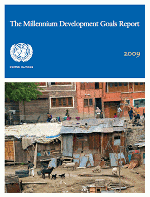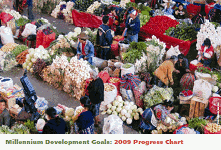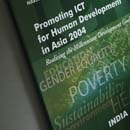|
In order to address the world’s main development challenges in the current millennium of thousand years from year 2000, the Millennium Summit was held at the United Nations headquarters in New York City with participation of many world leaders in September 2000. Its purpose was to discuss the role of the United Nations at the turn of the twenty-first century. This meeting was the largest gathering of world leaders in history as of the year 2000. In this meeting, the ‘United Nations Millennium Declaration’ was adopted by 189 nations-and signed by 147 heads of state.
The Millennium Development Goals (MDGs) , drawn from the actions and targets contained in the Declaration, are the 8 goals to be achieved by 2015 that respond to the world's main development challenges. The eight MDGs break down into 21 quantifiable targets that are measured by 60 indicators.
Goal 1: Eradicate extreme poverty and hunger
Goal 2: Achieve universal primary education
Goal 3: Promote gender equality and empower women
Goal 4: Reduce child mortality
Goal 5: Improve maternal health
Goal 6: Combat HIV/AIDS, malaria and other diseases
Goal 7: Ensure environmental sustainability
Goal 8: Develop a Global Partnership for Development
The countries have been preparing and publishing national reports that measure progress towards the MDGs on an annual basis. Such national MDG reports had been published by more than 140 of the participating countries.
So far there are significant advances together with important set-backs. Every region faces particular challenges but has the opportunity to work together in order to achieve the MDGs. Although there is a long way to go and some of the goals will be very difficult to reach, the goals are achievable with global political support, strong partnerships and coordinated efforts.
The United Nations Development Program (UNDP) is the official source of the information of the MDG and the status of the achievement of goals in various countries.
For details, please visit the MDG site : www.undp.org/mdg/basics.shtml
For more information, please visit the websites as follows :
1. MDG INIDICATORS WEBSITE :
Please visit the official MDG Indicators website as follows :
http://mdgs.un.org/unsd/mdg/Default.aspx
This site presents the official data, definitions, methodologies and sources for more than 60 indicators to measure progress towards the Millennium Development Goals. The data and analyses are the product of the work of the Inter-agency and Expert Group (IAEG) on MDG Indicators, coordinated by the United Nations Statistics Division. You will also find the official progress reports and documents produced by IAEG. Links to related sites and documents and constantly updated news will keep you up to date with the ongoing activities on MDG monitoring.
(A) MDG Report 2009 launched

The Millennium Development Goals Report 2009 was launched in Geneva by the Secretary-General on 6 July. The report, which presents the yearly assessment of global progress towards the MDGs, is prepared by the Statistics Division of DESA on the basis of inputs provided by the members of the Inter-agency and Expert Group on MDG Indicators. Less than six years away from the 2015 deadline to achieve the Millennium Development Goals (MDGs), the report warns that despite many successes, overall progress has been too slow for most of the targets to be met by 2015. And major advances in the fight against poverty and hunger have begun to slow or even reverse as a result of the global economic and food crises.
(B) MDG Progress Chart 2009

Most of the targets set for progress on the Millennium Development Goals are benchmarked for the period 1990 to 2015 — promising clear and measurable improvement on standards prevailing in 1990 by the end of 2015. The MDG Progress Chart 2009 provides an assessment of progress as of June 2009 towards a number of the key targets relating to each Goal.
2. ICT FOR MDG :
"Information and communication technologies have a central role to play in the quest for development, dignity and peace." - Ban Ki-moon, United Nations Secretary-General
Please visit the official website as follows for United Nations – Asian and Pacific Training Center for Information and Communication Technology (ICT) for Development (APCICTD) :
http://www.unapcict.org/
Please visit the website as follows for the official publication of National Human Development Report – Promoting ICT for Human Development in Asia: Realising the Millennium Development Goals – India
Authors: C.P. Chandrasekhar, Simran Kumar and Kiran Karnik
© UNDP, Nasscom, 2004, 96 pages

http://www.unapcict.org/ecohub/resources/national-human-development-report-2013-promoting |

